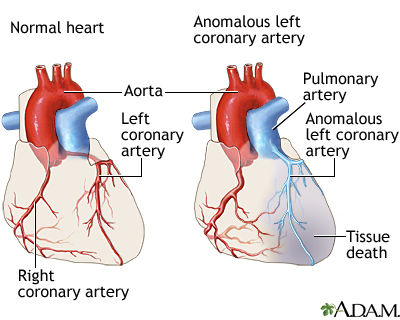Case Report: 2 yo child with the ALCAPA Syndrome
- Dr. Steve Yun, M.D.
- Oct 5, 2017
- 2 min read
Hi, my name is Dr. Steve Yun, M.D., and I am a board-certified dental anesthesiologist in Southern California.

(Above diagram taken from www.medlineplus.gov).
The ALCAPA Syndrome is a rare congenital heart defect that affects 1 of every 300,000 live births. ALCAPA stands for Anomalous Left Coronary Artery from the Pulmonary Artery. The left coronary artery is the main artery that supplies oxygen-rich blood to the heart muscle. Normally, the left coronary artery arises from the aorta, but in the ALCAPA Syndrome, the artery arises from the pulmonary blood vessel which carries oxygen-poor blood. As a result, the heart muscle is deprived of oxygen.
When the heart muscle does not get enough oxygen, the muscle begins to die and the infants can actually have a "heart attack." If not diagnosed and treated, most babies with the ALCAPA Syndrome will die within the first year.
Recently, I was asked to take care of a beautiful 2 year old girl who needed extensive dental rehabilitation for numerous cavities. She had been diagnosed with the ALCAPA Syndrome at the age of 4 months, and immediately underwent corrective surgery at that time. Since then, her development and health have been normal.
In evaluating the child with congenital heart disease for dental office anesthesia, several key questions must be answered:
1. What is the status of the child's heart? Is their heart function normal? Have they fully recovered from their surgery? Is there any residual damage to the heart muscle or heart valves?
2. Does the child need to take any special antibiotics to protect her heart from an infection? The mouth is home to millions of bacteria, and during dental procedures, bacteria is often released into the bloodstream which can infect the heart and/or the heart valves.
3. Can the dentist use local anesthesia that contains adrenalin? Adrenalin is used in very small amounts with local anesthesia to increase the efficacy of the numbing medicine. However, adrenalin can have negative effects on the heart, such as a rapid increase in the heart rate or blood pressure. This may or may not be tolerated in a child who has congenital heart disease.
For these types of cases, clear and open communication with the child's heart doctor is essential. I personally prefer to talk directly to the pediatric cardiologist to make sure all bases are covered.
In this particular case, the pediatric cardiologist was in wonderful in returning my call and answering all my questions. As a result, I was able to provide a safe, smooth anesthesia experience for this child and she now has a fresh start with her dental hygiene.
Thanks to advances in technology and techniques, more and more children are living happy, normal lives after undergoing correction for congenital heart defects. Unfortunately, we have not made as much progress with dental caries, which has become a true epidemic in today's kids. Thus, more children with congenital heart disease will need dental treatment, and a small minority of them may require general anesthesia services. With close, careful communication, these children can be safely taken care of in the dental office setting.

























Comments